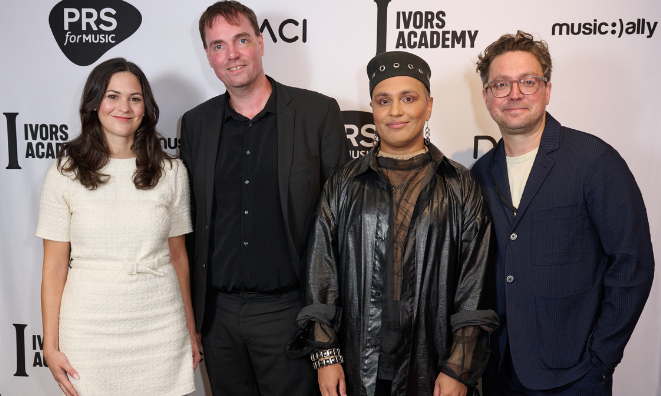With those lines our summit was open. Supported by PRS for Music, sponsored by DAACI and with Music Ally as media partner, the event heard from policy makers, tech companies, collecting societies, and music makers who spoke and presented to a room full of creators who wanted to learn what making music in the era of AI may have in store.
Our first panel, moderated by The Ivors Academy Trust Chair Cliff Fluet, set the scene by looking at the impact of AI on music creation. Rachel Lykse, CEO of DAACI ; Lydia Gregory, CEO and co-founder of Figaro; and Thomas Bouabca, Director of Data Science at Deezer set out the challenges and opportunities that music makers will now face. AI can be used to generate a cover of ‘Johnny Cash’ singing Barbie Girl, but also might be used to find and trace when this happens, allowing the artists and writers whose creativity is being used to monetise when this happens.
The Human Artistry Campaign, a global initiative of which the Ivors Academy is a member, briefed us on current, bipartisan proposals in the USA to create new federal personality rights to help protect creators and give them stronger rights to protect them from deepfakes.
Creator choice, consent, and remuneration were the focus of our second panel discussion which was chaired by Ivors Academy board member Julia Montero, with contributions from Dr Hayleigh Bosher, Reader in IP at Brunel University; Jamie Smith, Partner in the Interactive Group at Sheridans; Maria Luciana Axente, Head of AI Public Policy & Ethics at PwC UK; and Nicola Solomon, Chair of the Creators’ Rights Alliance. We heard that creators need to start inserting terms around AI into contracts when they are commissioned to ensure there is clarity around their future use and speak to their publishers and labels to get clarity on the topic when AI isn’t dealt with clearly in their current agreements. With the Council of Music Makers, we have produced a letter of non-consent for our members to help you ensure your rights are protected.
The keynote speaker for the conference was Axel Voss MEP, who has been at the heart of creating the EU’s AI Act, which will create transparency requirements around AI and regulate high-risk and foundational AI models. The Act is currently in a period of ‘trilogue’ where the EU Parliament, Commission, and Council are negotiating a final version of the Act before the end of this year.
Lucas Cantor Santiago, the composer who used AI to complete Schubert’s Unfinished Symphony talked about the first 60,000 years of music leading to AI. Where pre-historic humans used animal bones to make a flute that was unique to them to make the music they wanted and now humans will use computers fine-tuned to them to make the music they want.
PRS for Music, a sponsor of the event revealed the results of a survey of their members which found that around 7 out of 10 are not currently using AI in their music-related activities, but those that are are using it in activities to support their music, such as creating album artworks (13%), mixing or mastering (11%), or music production (8%). Only 5% of those surveyed are currently using AI to support their songwriting. The survey also found that 93% of respondents believe that creators deserve to be compensated if their music is used for AI-generated content and nearly nine in ten feel that AI tools should be transparent about how they generate AI works (89%), and that they would like to be able to decide if their music is used to train AI tools (86%).
In the final panel, moderated by Chair of The Ivors Academy Tom Gray, we heard from creators and their representatives. Ilā Kamalagharan, Artist, producer and creative director; Jesper Hansen, Vice-President of ECSA; and Lulu Patin, Partner at Loop Legal Inc shared their concerns on AI and the opportunities it may provide. Ilā who uses AI to compose said it can be quite reflective hearing an AI learning from your music, but the quantity of music it produces can lead to choice paralysis about how to use the content it can generate.
The Ivors Academy is working alongside other music makers through the Council of Music Makers to ensure that the training, licensing and commercialisation of music-making generative AI models is achieved in a way that respects the rights of human creators by publishing five fundamentals that should be fully embraced by technology companies and the music industry as they develop new music AI technologies:
- Where licensing deals are negotiated in respect of AI technologies, the explicit consent of individual music-makers must be secured before music is used to train AI models. Such consent cannot be inferred by rights-holders or technology companies.
- The publicity, personality and personal data rights of music-makers must be respected. These rights belong to individual music-makers and cannot be exploited – by AI companies or rights-holders – without explicit consent. The UK government should clarify and strengthen these rights, and collaborate internationally to promote a robust global rights regime.
- Where permission is granted, music-makers must share fairly in the financial rewards of music AI, including from music generated by AI models trained on their work.
- As AI companies and rights-holders develop licensing models, they must proactively consult music-makers and reach agreement on how each stakeholder will share in the revenue from AI products and services.
- AI-generated works must be clearly labelled as such and AI companies must be fully transparent about the music that has been used to train their models, keeping and making available complete records of datasets. Rights-holders must be transparent about all licensing deals that have been negotiated with AI companies and what works those deals include.
AI presents opportunities for the music business. However, the rights of music-makers – including artists, musicians, songwriters and studio producers – must be respected by technology companies and rights-holders as music AI models are trained and new AI-powered products and services are developed.
Paul Mortimer, Public Affairs and Campaigns Coordinator at The Ivors Academy





